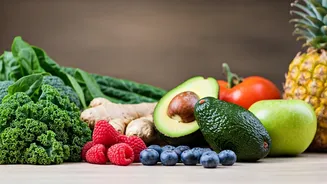Ginger's Digestive Aid
Ginger is known for its ability to speed up stomach emptying, which can diminish feelings of fullness and the production of gas. It's thought to help move
food along the digestive tract efficiently, potentially reducing the likelihood of gas buildup. For centuries, ginger has been a common remedy across numerous cultures to mitigate nausea and other gastric disturbances. It contains gingerol, a substance believed to possess anti-inflammatory and antioxidant qualities. Including ginger in your diet, whether through tea, fresh slices, or incorporating it in meals, might provide relief from bloating.
Peppermint's Calming Effect
Peppermint can relax the muscles of the digestive tract, especially those in the colon, which can assist in easing spasms and releasing trapped gas. The menthol in peppermint offers a soothing effect on the gut, potentially reducing abdominal discomfort. It often comes in the form of tea or peppermint oil capsules, both recognized for soothing irritable bowel syndrome (IBS) symptoms, including bloating. The calming effect on the digestive muscles helps to ensure more efficient processing of food, and prevents bloating. Adding peppermint to your regimen could prove to be an efficient method for digestive comfort.
Fennel Seeds for Relief
Fennel seeds have been used traditionally as a digestive aid, particularly to soothe bloating and gas. They contain compounds that can help relax intestinal muscles, which facilitates the passage of gas. Chewing fennel seeds after a meal is a common practice to encourage healthy digestion. Fennel also has anti-inflammatory properties that can soothe the digestive tract and diminish swelling. The distinct flavor of fennel makes it easy to incorporate into dishes or beverages, and it provides a straightforward method to help your gut function efficiently, relieving symptoms of bloating.
Papaya's Enzyme Power
Papaya possesses an enzyme named papain, which contributes to the breakdown of proteins, thereby aiding digestion and reducing bloating. Papain also has anti-inflammatory properties, making it an excellent fruit for a calm digestive system. Eating papaya can therefore assist the digestive process, thereby potentially alleviating gas and bloating. The tropical fruit is not only delicious but also a natural remedy that aids in smoother digestion. Therefore, adding papaya to your diet can provide relief from uncomfortable bloating.
Turmeric's Anti-Inflammatory Action
Turmeric contains curcumin, a potent compound that exhibits anti-inflammatory qualities. Inflammation in the digestive system can contribute to bloating and discomfort. By reducing inflammation, turmeric can aid in improving gut function. Including turmeric in your diet, often through cooking with the spice or drinking turmeric tea, can improve digestive health. Its antioxidant properties make it a supportive choice for gut health and reducing swelling. Consuming turmeric frequently might lessen the severity of bloating and related digestive issues.
Pineapple’s Bromelain Benefit
Pineapple contains bromelain, an enzyme that assists in protein digestion and reduces bloating. Bromelain can also lower inflammation in the digestive tract, potentially reducing the sensation of bloating. Incorporating pineapple into your diet might help to enhance digestion and decrease gas production. This tropical fruit not only tastes great, but its enzymes can provide a natural solution to digestive discomfort. Pineapple's bromelain may act as a helpful agent in supporting a healthy gut and reducing bloat-related issues.
Bananas for Potassium
Bananas, being a great source of potassium, help regulate sodium levels in your body. When there is excessive sodium, it may lead to fluid retention, which can cause bloating. Adding bananas to your diet can help balance electrolytes, assisting your body in shedding excess water. Bananas are a convenient and nutritious snack that can prevent bloating. By enjoying a banana, you can contribute to a more comfortable, bloat-free feeling.
Asparagus's Diuretic Properties
Asparagus is a natural diuretic, which means it encourages your body to remove excess water through urination. By aiding in water removal, asparagus can significantly reduce bloating. It has compounds that encourage kidney function, assisting the elimination of extra fluid from the body. Eating asparagus is a great way to decrease bloating and support overall digestive health. Including this vegetable in your meals can contribute to a less swollen and more comfortable digestive state.
Yogurt and Probiotics
Yogurt that contains live and active cultures of probiotics helps balance the beneficial bacteria in your gut. This can lead to improved digestion and the reduction of gas and bloating. These good bacteria in yogurt help break down food efficiently, which decreases the likelihood of gas production. Regularly consuming yogurt with probiotics can improve gut health, minimize bloating, and improve your overall digestive comfort. It can enhance the gut's health and offer relief from bloating.
Water's Hydrating Role
Drinking adequate amounts of water daily is crucial for several aspects of digestion, and it is a simple yet effective way to prevent bloating. Water aids in the movement of food through your digestive tract, helping to avoid constipation, a common cause of bloating. Proper hydration facilitates the efficient elimination of waste and prevents the accumulation of gas. Making sure you are properly hydrated by drinking sufficient water each day is a simple yet crucial strategy to support digestive health and prevent bloat-related issues. Staying well-hydrated makes it easier for your gut to function at its best, which keeps you feeling comfortable and healthy.












